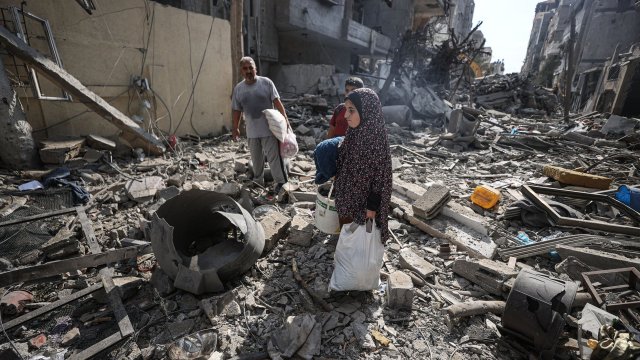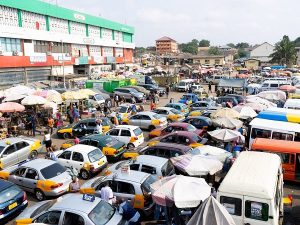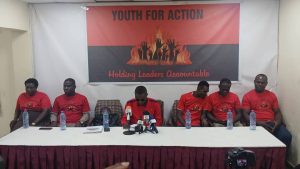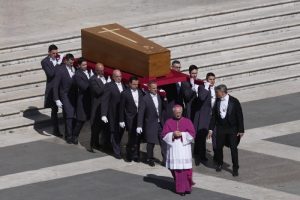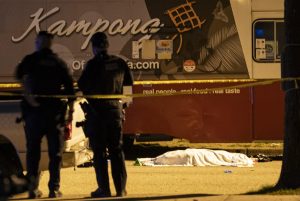More than 100 Palestinians have been killed in air strikes in southern Gaza, officials say, as the Israeli military continues to target the area despite ordering civilians to shelter there.
Most of the dead reportedly fled their homes in the north ahead of what is expected to be a major ground offensive against the militant group Hamas.
The military said it struck a series of Hamas targets in the south.
There is also mounting concern about humanitarian conditions in Gaza.
The US said it had agreed to develop a plan with Israel that would enable aid to reach civilians in the Hamas-governed territory, as UN aid agencies warned that hospitals’ fuel supplies were unlikely to last more than 24 hours, water was extremely limited and shops only had a few days of food left.
There have been hopes of opening Egypt’s Rafah crossing to let lorryloads of urgently needed aid in and Palestinians with foreign passports out. But an Israeli strike reportedly damaged a building at the crossing on Monday.
Israel cut electricity and most water and stopped deliveries of food and medicine through its crossings in response to an unprecedented cross-border attack by Hamas militants on 7 October in which at least 1,300 people were killed and 199 others taken hostage.
More than 2,800 people have been killed in Israel’s bombardment of Gaza since then, according to health officials.
The BBC’s Rushdi Abu Alouf in Khan Younis says that what happened overnight in southern Gaza is very worrying for the hundreds of thousands of people who have complied with last Friday’s order from the Israeli military to evacuate northern Gaza for their “own safety”.
Local officials in Khan Younis said three Israeli air strikes left more than 100 people dead, most of whom were displaced.
Amin Hneideq said his daughter was wounded by a bomb that destroyed a nearby home and killed a family who had fled southwards. “They brought them from the north just to strike them in the south,” he told Reuters news agency.
The Israeli military said on Tuesday morning that it had struck operational command centres, military infrastructure with operatives inside, and hideouts belonging to Hamas in Khan Younis and Rafah, to the south, as well as the northern areas of Zeitoun and Jabalia.
Many displaced people in Khan Younis told the BBC that they were planning to pack up their belongings and return to their homes.
One man said he had been sleeping in the street for the last couple of days, and that he would prefer to die in dignity than to die from thirst.
Khan Younis, Rafah and other southern communities have been overwhelmed by the need to accommodate and feed more than 600,000 displaced people. Another 400,000 people have sought shelter elsewhere in the Strip.
“Every day it’s a daily mission for everyone to go to find things to feed their children,” filmmaker Yousef Hammash told BBC Radio 5 Live, adding that everyone was suffering extreme stress and were existing in “survival mode”.
Some water was brought to Khan Younis from a store in Gaza City on Tuesday, which was risky because there was no guarantee the lorries would not be targeted by Israeli forces.
The UN’s agency for Palestinian refugees, Unrwa, said Israel opened one line of water to southern Gaza for three hours on Monday, but that only 14% of the Strip’s 2.2 million population were able to benefit.
Gaza’s last functioning seawater desalination plant was also forced to shut down due to a lack of fuel on Monday, increasing concerns over dehydration and waterborne diseases.
The hospital in Khan Younis, which has been struggling to deal with the many people wounded in air strikes, said it would run out of fuel for its back-up generators at midnight, placing the lives of patients at serious risk.
People have been trying to secure additional fuel at local petrol stations and companies, which would allow the hospital to keep functioning.
The World Food Programme also said that food shops in Gaza had just four or five days of supplies left. It added that there might be a few days’ more in warehouses, but the Israeli strikes were making access very difficult.
Despite such warnings, an Israeli military spokesman insisted that “there is no humanitarian crisis right now in Gaza”.
“We do not have the commitment to supply Hamas electricity,” Lt Col Richard Hecht told BBC Newsnight.
“People who attacked us, they’ve been in control for multiple years already in the Gaza Strip. They have electricity… I also see water in the south of Gaza.”
The UN human rights office meanwhile said Israel’s order for 1.1 million civilians to evacuate, combined with the imposition of its “complete siege” on Gaza, could constitute the “forcible transfer of civilians in violation of international law”.
Spokeswoman Ravina Shamdasani also said reports of attacks on civilians attempting to flee had to be investigated independently and warned that “we cannot have collective punishment of an entire population because of an attack by militants.”
The office appealed again for Hamas and other Palestinian militant groups to immediately and unconditionally release all of the hostages being held in Gaza and to stop firing indiscriminate rockets at Israeli cities and towns.
Source:bbc.com

